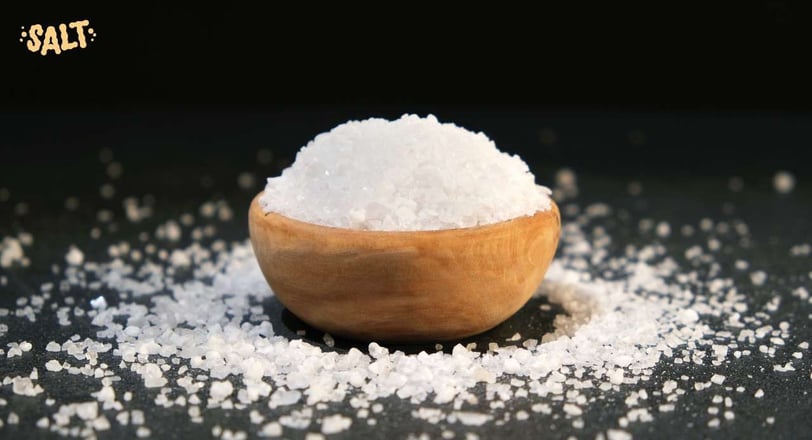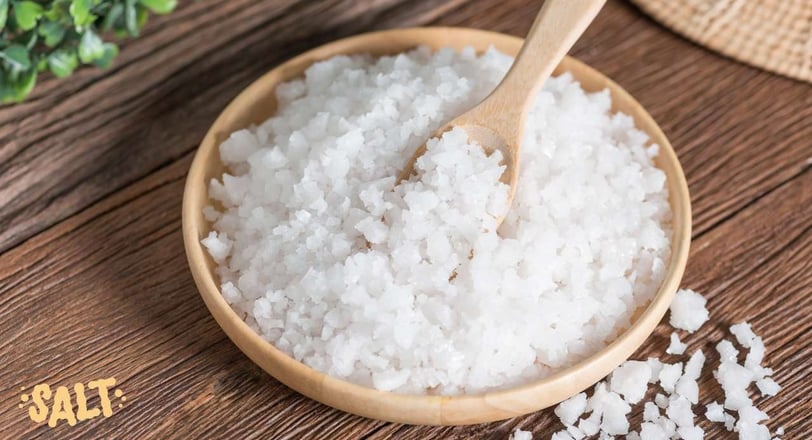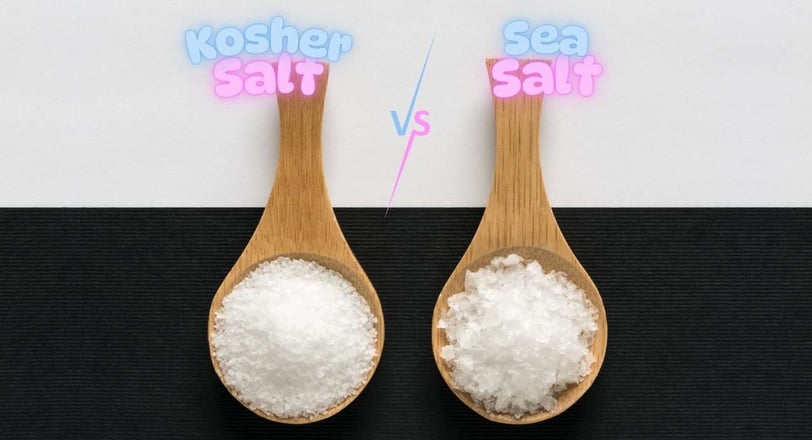Kosher Salt vs. Sea Salt
You can’t cook without salt every cook knows this, whether you're whipping something up at home or working in a professional kitchen. But when it comes to kosher salt and sea salt, which one should you reach for? They’re both staples, but they’re not the same, and they’re not always interchangeable. Let’s dive into when to use kosher salt, when sea salt shines, and how they’re different.
What Is Kosher Salt?
Kosher salt comes from seawater that’s evaporated to leave behind chunky, coarse crystals.The size of the crystals is the main difference between sea salt and kosher salt. Chefs like kosher salt because of its larger, rougher grains, which are very easy to grip and apply properly. Ever watch a professional chef cooking? They always seem to grab a pinch of kosher salt—it’s that easy to handle. Plus, its clean taste makes it perfect for seasoning during the cooking process.
What Is Sea Salt?
Sea salt, as you might guess, is also made by evaporating seawater, but it’s taken a step further. It can have small differences in taste and even color due to the minerals it retains from the water it comes from. What's cool about sea salt? It is produced all over the world, ranging from the Mediterranean to the United States, where regions like Oregon and Cape Cod are renowned for producing unique kinds of sea salt.
What Is Kosher Salt Used For?
Kosher salt is a common kitchen essential for good reason—it's simple to use and adaptable. It is useful in the following ways:
〰 Salting pasta water: It’s perfect for giving your pasta that perfectly seasoned base.
〰 Brining meats: Helps keep them juicy and full of flavor.
〰 Making dry rubs: Ideal for grilling or roasting.
〰 Rimming cocktail glasses: That classic salty touch for margaritas or other drinks.


What Are the Differences Between Kosher Salt and Sea Salt?
Composition
Kosher salt is mostly sodium chloride, sometimes with anti-caking agents added. Sea salt, on the other hand, also contains sodium chloride but often has trace minerals like magnesium, calcium, and iodine, depending on where it’s harvested.
Health Benefits
All salt—whether it’s kosher, sea, or table—has the same sodium content by weight, meaning it’ll affect your blood pressure the same way. What's the difference? Kosher salt contains less sodium per teaspoon than table salt because its crystals are bigger. This is similar to coarse sea salt, but finely ground sea salt has a higher sodium content per volume.
Shape and Texture
Kosher salt grains are usually large and flat, though some brands may have pyramid-like crystals. Sea salt offers more variety, coming in fine or coarse textures, with colors influenced by minerals from its source.
Can You Substitute Sea Salt for Kosher Salt?
It depends on what you’re making. If it’s baking, stick with what your recipe calls for—baking is precise, and the wrong salt can throw things off. But in general cooking, sea salt and kosher salt can often be swapped. Just remember to taste as you go to avoid over-salting.
Sea Salt vs. Kosher Salt Taste
Sea salt has a bit more complexity thanks to its trace minerals, while kosher salt has a clean, straightforward salty flavor. If you’re making something where the saltiness stands out, sea salt might add a little extra depth. But for everyday cooking, kosher salt works just fine.
So, What’s the Real Difference?
The main differences lie in texture, price, and origin. Kosher salt is affordable and versatile—it blends easily into recipes. However, sea salt's mineral-rich structure and unique texture add a touch of luxury. It's like comparing a special occasion delight with a reliable everyday product.


When to Use Kosher Salt vs. Sea Salt
〰 Kosher salt is excellent for regular cooking. It evenly seasons meals and dissolves rapidly. Consider pasta water, meats, or soups.
〰 Sea salt is ideal for finishing dishes. Sprinkle it over salads, steaks, or roasted vegetables to bring out its crisp and minerality. When flavor and presentation are important, the higher cost is justified.
Sea Salt vs. Kosher Salt for Cooking
Because it dissolves rapidly and is easy to measure, kosher salt is frequently used in cooking. Sea salt also works well, particularly if you want to give your food a unique flavor or texture. Kosher salt is dependable and adaptable, so use it if in doubt.
Sea Salt vs. Kosher Salt for Baking
For baking, kosher salt is often the better choice because its coarse grains are easier to measure and control. Although sea salt can also be used, its flavors and textures might differ greatly, which could affect your recipe. It's safe to use kosher salt if the recipe doesn't say otherwise.
Sea Salt vs. Kosher Salt: Which Is Healthier?
Both sea salt and kosher salt are about the same when it comes to health—they’re sodium-based, so moderation is key. While sea salt might have trace minerals, the amounts are usually too tiny to make a big difference. What matters most is how much salt you use.
Compared to other salts


Kosher Salt vs. Sea Salt vs. Table Salt
Every salt type has an own personality. The go-to salt for brining and seasoning is kosher salt. Sea salt's variety of flavors and textures adds flair. Compared to table salt is all about precision and is often used in baking where measurements matter most.
Pink Sea Salt vs. Table Salt
Like Himalayan salt, pink sea salt is lightly processed and contains trace minerals like potassium and magnesium, which give it its unique color and little different flavor. On the other hand, table salt is heavily treated and frequently contains anti-caking agents and iodine. Both are useful, but table salt is your dependable, everyday choice, while pink salt gives off a more organic vibe.
Coarse Sea Salt vs. Kosher Salt
Because of its larger, crunchier crystals, coarse sea salt is ideal for adding a little texture to recipes. On the other hand, kosher salt spreads evenly and dissolves fast, making it perfect for cooking and seasoning meats.
Celtic Sea Salt vs. Kosher Salt
Celtic sea salt is a special option for dish finishing because it is wet, briny, and full of minerals. In contrast, kosher salt is easy to handle, dry, and has a clean flavor for regular seasoning. In most kitchens, kosher salt is the more adaptable choice, even if Celtic sea salt has its own charm.
Read more about: Celtic Sea Salt: Benefits, Uses & Celtic vs Himalayan Salt
Flaky Sea Salt vs. Kosher Salt
Flaky sea salt is delicate and light, making it ideal for giving your food a little crunch and flair. On the other hand, kosher salt is less costly and perfect for regular cooking. Use kosher salt for cooking and seasoning, and flaky sea salt for dish finishing.
When to Use Kosher vs. Sea Salt
Use kosher salt for general cooking, brining, and seasoning meat—it dissolves quickly and spreads evenly. Sea salt is better for finishing touches or when you want to showcase its unique flavor and texture. Think of kosher salt as your everyday hero and sea salt as the special guest star.
FAQs
What Is Kosher Salt vs. Sea Salt?
Kosher salt gets its name because it’s traditionally used in koshering meat, not because it’s certified kosher (though it often is). Its coarse grains are great for drawing out moisture. Sea salt, on the other hand, is evaporated from seawater and can vary in texture, flavor, and mineral content depending on its source.
Is Kosher Salt Iodized?
Nope, kosher salt isn’t iodized, and that’s one of its standout features compared to table salt. Since it doesn’t have iodine (which can sometimes taste a little bitter), kosher salt has a clean, pure flavor. This makes it a favorite for people who want a straightforward saltiness in their food.
Does Salt Expire or Go Bad?
Salt doesn’t really expire—it’s a natural preservative. However, if it’s exposed to moisture, it can clump or lose its free-flowing texture. Flavored or infused salts might lose their potency over time, so keep them stored in a cool, dry place.
What Is the Healthiest Salt?
No salt is inherently healthier than another. While unrefined salts like Himalayan or Celtic sea salt might have trace minerals, they’re usually present in tiny amounts. The key is moderation, regardless of the type of salt you use.




